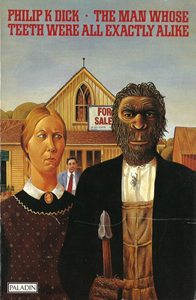“The Man Whose Teeth Were All Exactly Alike” (written in 1960, published in 1984) is about a lot of different things, and the theme doesn’t coalesce until the final pages. Despite being hard to pin down at first, this Bay Area-set novel is a page-turner about people who behave one way toward their spouse, think another way, present themselves to the community in a third way, and ultimately show their true colors in a fourth way.
Marital strife
This is one of those PKD character pieces where a man will be enjoying pie with his wife in the evening while thinking about how to get out of the marriage. Yet the two protagonists – Leo Runcible and Walt Dombrosio – are not clever schemers; they are real, bumbling, morally inconsistent people. “Man Whose Teeth” is not directly comical; it doesn’t have many lines that make me laugh out loud. But it features a very funny plot set in southern Marin County as it changes from rural to suburban.
Product fabricator Dombrosio is feuding with his Carquinez neighbor, the real-estate agent Runcible. Dombrosio aims to make Runcible look bad by planting the fake archeological artifact of the title. Dombrosio is worried his hastily implemented plan might backfire. He has worked up such a convoluted cause-and-effect in his mind that he blames Runcible for almost everything bad in his life.

“The Man Whose Teeth Were All Exactly Alike” (1984)
Composition year: 1960
Author: Philip K. Dick
Genre: Character drama
Setting: 1960, southern Marin County
And Runcible is much the same way, as we see from the opening scene: Dombrosio invites a black man to his house for dinner; Runcible’s houseguest – a potential home-buyer – asks about the presence of black residents in the area. Runcible rips into his guest for being a racist, thus costing him a friendship and a sale. He then blames Dombrosio.
Racism is a fascinating background theme in the book. Runciter is Jewish and Dombrosio is Italian, and even though neither of them – nor their wives, Janet and Sherry – are racist (as the opening chapter clearly shows), the idea of race is ever-present. Some of them use racist language in tense moments.
Feminist issues and gender roles
PKD is also deeply interested in feminist issues and gender roles in this novel. At the core of both these proud men are the neuroses brought on by their conflicting beliefs about their roles in society in relation to their wives’ roles.
Dombrosio quits his San Francisco-based job partly out of pique that his wife, Sherry, is applying for a job there – then he precedes to hate her for becoming the “man” in the relationship. PKD gives us the women’s POV sometimes, too, and Sherry sometimes reflects that Walt has failed in his husbandly duty to hold down a job. Even though she wants and enjoys her job.
Their relationship is a classic example of the thin line between love and hate. In the hilarious chapter 16, chronicling their biggest fight, Walt admits that he loves her and that he hates her. Chapter 12 is also an eye-opening portrayal of how an intimate husband-wife encounter might cross the line into rape. The spousal politics of abortion – and whether the child’s fate is equally in the man’s control – comes into a play too.
While it’s easy for us to say today that Walt should adjust and go with the flow of changing gender roles, “Man Whose Teeth” – which takes place contemporary with its writing — includes honest analysis of the real-world reasons why Walt is uneasy.
Some of this comes through Runcible’s view of his neighbor – whose house he can see, appropriately, by looking down a hill. Runcible believes there’s something inherently wrong with a family where the wife has a job and the husband does not. PKD probably is not using either of these men as a stand-in, but the author certainly believes that change is messy, and he portrays that in clever, humorous and sometimes intense fashion.
Scientific and geographic history
This is more than just a character piece, though. “Man Whose Teeth” gets into scientific and geographic history more than most of PKD’s works. The reason for the odd title doesn’t come up until more than halfway through the book, as Runcible discovers what might be a Neanderthal skull on his property.
I learned a lot more about the history of dawn men (near-humans that co-existed in the early days of humans) than I ever imagined from a PKD book. Neanderthal skulls haven’t been found in the Americas, so if the skull is real, Runcible will gain fame and perhaps riches.
I was fascinated by PKD’s description of both the town of Carquinez, where the main characters live, and the old oyster-farming village of the same name – on the other side of a hard-to-navigate ridge. The old town, last prosperous four decades earlier, reminds me of the horror/thriller novels of Douglas Preston and Lincoln Child. While this isn’t a horror story, we do get a fascinating mystery about the skull to be solved among the crumbling ocean-side shacks.
This book had me checking the internet to see if Carquinez is a real place; it’s not, although the geography of the area is accurate. And I suspect PKD is not making up the economic issues out of whole cloth.
People are weird
It’s impressive how much knowledge he drops about the mundane politics and economics of a changing and growing community. In particular, he gets into the nuts and bolts of a utility – a water company in this case. It’s in the long-term interest of Carquinez that the water quality improves, but it’s in the short-term interest of no one’s finances.
PKD does deliver a solution to the water problem before the book ends, and it might not be the most convincing thing he’s ever written. It does nicely tie in with a character arc, though, and it helps to make an overall point. Some people who are unlikable on the outside can end up doing heroically unselfish deeds. Even more bizarre, they can decide to do the right thing after engaging in a string of immoral choices.
Reputation is not the same as a person’s inner character. Yet knowledge of one’s reputation can shape a person’s decisions. People are weird, and PKD wonderfully communicates that universal truth in this novel.


